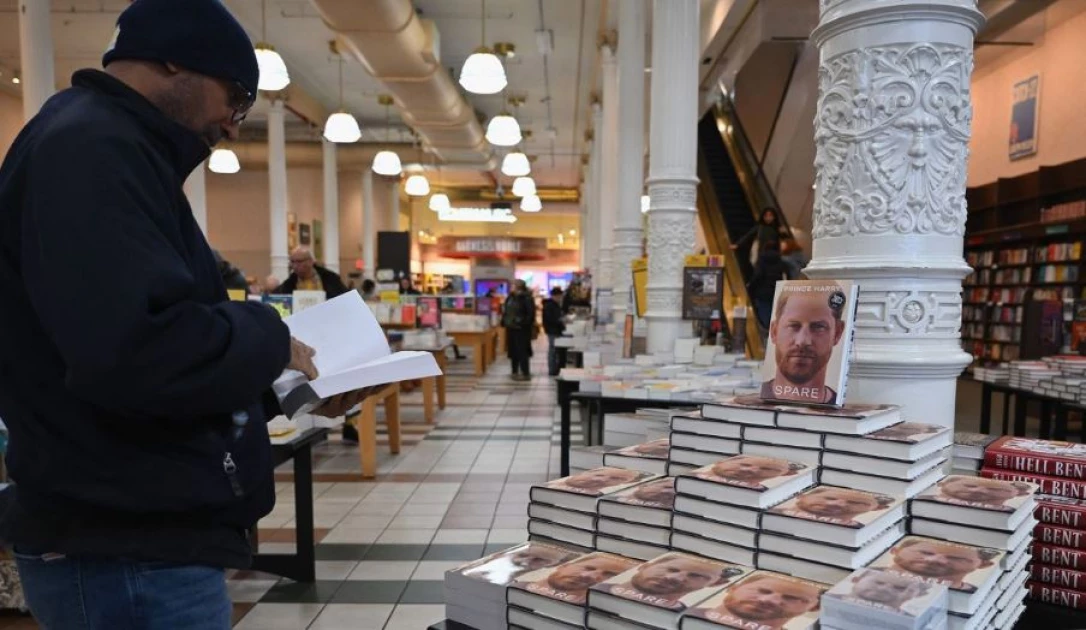The British royal family’s response to Prince Harry’s memoir is telling

Copies of "Spare" on display at a Barnes & Noble bookstore in New York City
Last week was all about the
Duke of Sussex. This week, it’s the royal family’s turn.
Considering the disclosures from the vexed prince – both
in his book, “Spare,” and his promotional media appearances – many were curious
about how the clan would handle returning to the public eye after the holidays.
When asked by US comedian Stephen Colbert last week,
Prince Harry said “of course” his family, along with the British media, is
actively campaigning to undermine his book. The royal added: “After 38 years,
they have told their side of the story. This is the other side of the story and
there’s a lot in there that perhaps makes people feel uncomfortable and
scared.”
However, the reality is not quite as black and white.
Certainly, multiple British newspapers are still running frequent follow-up
headlines using sound-bites from commentators. But there appears little
evidence of a coordinated effort from an army of unnamed palace sources, as
Harry has asserted, to debunk his grievances. And, of course, there continues
to be radio silence from the palace whenever the book is raised.
What we have seen is the Windsors throwing themselves
into lots of walkabouts and meetings as they embarked on their first
engagements of the year.
King Charles and the Prince and Princess of Wales kicked
things off two days after “Spare” hit bookshelves. Up in Scotland, the monarch
laughed heartily with members of the public while at a local community space
aiming to combat rural loneliness.
The same day, William and Kate appeared at ease as they
called in at the new Royal Liverpool University Hospital and the mental health
charity Open Door in Merseyside, northern England. There were no signs of
apparent sadness over their disgruntled relative in California and questions
shouted toward the couple asking if they had been “hurt by the comments in
Harry’s book” went unanswered.
In the days since, senior royals have conducted
engagements at schools, youth charities and other royal patronages.
The prince’s tell-all has
gone on to break records, with its publisher claiming Tuesday that it had sold
three quarters of a million copies in the UK since its release. Larry Finlay,
managing director of Transworld Penguin Random House, said: “We announced last
week that SPARE was the fastest selling non-fiction book ever on its first day
of publication, a record that has been confirmed by Guinness World Records. We
now know that it is also the biggest selling memoir ever in its first week of
publication.”
That doesn’t appear to have fazed the royals. They will
be keenly aware of the optics following the book’s publication. But rather than
be dragged deeper into the soap opera by releasing statements or canceling
planned events, they have focused on earning back any civic trust that may have
been damaged – by getting back to work.
The royals know “the power of our platform,” as Harry so
succinctly put it in his memoir. They know that they need to be seen, that
personally greeting the public at events they care about resonates long after
they leave and that throwing the royal spotlight on local enterprises can
amplify an organization’s message and needs like nothing else.
Their actions this past week have served as a reminder to
the public that family feuds aren’t stealing their attention. It remains firmly
on the British people and the challenges they face as the new year gets
underway. King Charles’ recent request to use some of the Crown Estate profits
for “the wider public good,” instead of reinforcing the royal coffers, is
another example of this.
The Crown Estate announced Thursday that six new offshore
wind energy lease agreements had generated a large windfall. Through an
arrangement established in 1760, the monarch surrenders all profits from the
estate to the UK government in return for a slice called the Sovereign Grant –
which is essentially the King’s expense account.
However, a Buckingham Palace spokesperson told CNN: “In
view of the offshore energy windfall, The Keeper of the Privy Purse has written
to the Prime Minister and Chancellor to share The King’s wish that this windfall
be directed for wider public good, rather than to the Sovereign Grant, through
an appropriate reduction in the proportion of Crown Estate surplus that funds
the Sovereign Grant.”
As royal trustees of the
fund, Prime Minister Rishi Sunak, Chancellor of the Exchequer Jeremy Hunt and
Keeper of the Privy Purse Michael Stevens determine the actual amount of the
grant. The fund is currently set at 25% of the annual net profits of the Crown
Estate. That means that in the past financial year the UK Treasury paid out
£86.3 million, which is used to cover official travel, staff costs and palace
expenses.
The exact sum headed to the public purse from the King is
not yet clear. It also won’t leave him worse off this year because the amount
he receives is based on the two financial years prior – so the impact of the
monarch’s moves won’t hit the grant until 2024-2025. But it will probably be
seen as a welcome symbolic gesture at a time when families across the nation
are grappling with financial hardship.
King Charles has previously shown himself to be mindful
of the ongoing cost-of-living crisis, having acknowledged how people in the UK
may have struggled to pay their bills and “keep their families fed and warm” in
his first Christmas broadcast.
And without complaining or explaining, the family have
chosen their response – to lean into their value through service rather than
engage in a war of words that would do them more harm than good.
Want to send us a story? SMS to 25170 or WhatsApp 0743570000 or Submit on Citizen Digital or email wananchi@royalmedia.co.ke
Comments
No comments yet.


Leave a Comment